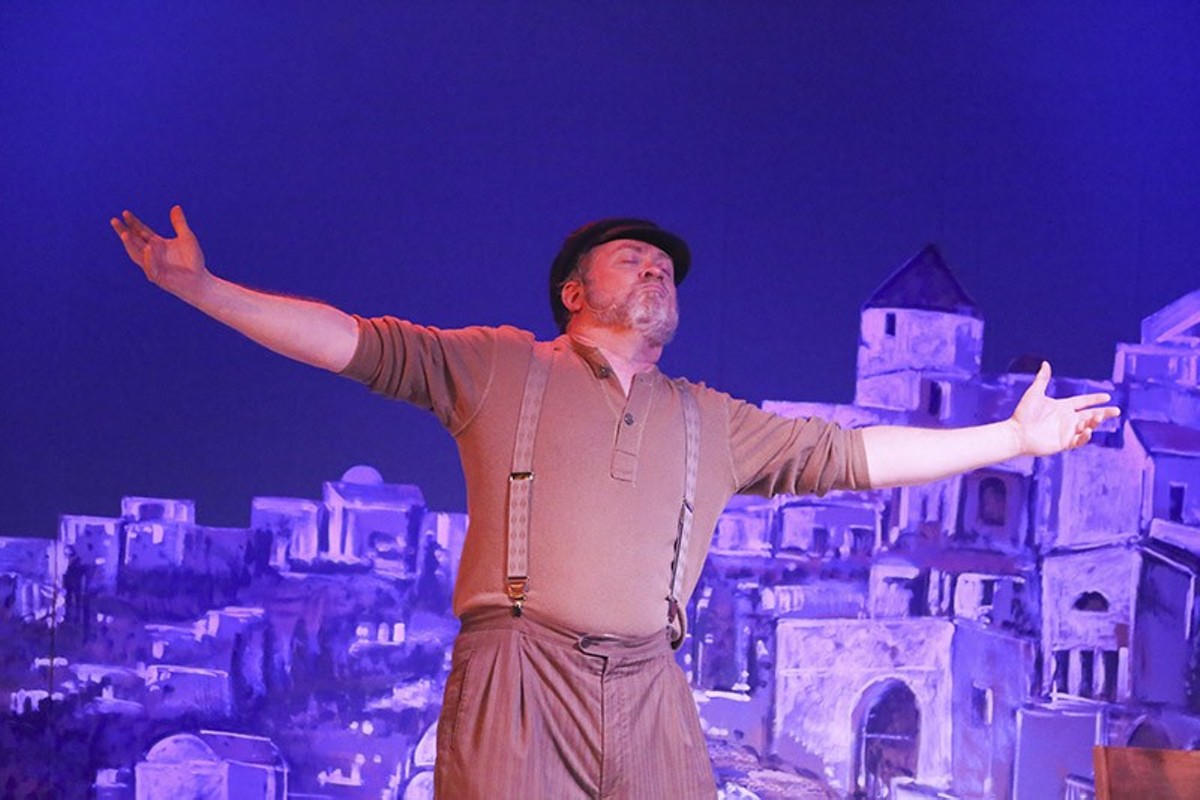Zorbá is an old show, both in the sense of its chronological age and its feeling. When mounted properly, it is a musical that feels familiar, comfortable and true. When it's presented badly, it feels stagey, dull and preachy. Thankfully, New Line Theatre's current production of this rarely produced classic is a lived-in marvel of beauty and honesty. And it has a lot of bouzouki, which is always nice (the stringed Greek instrument is criminally underused in musicals).
Much of the credit should be heaped upon the shoulders of Kent Coffel, who plays Zorbá as an aged rake who loves sharing an instructive story almost as much as he enjoys pursuing women and breaking into dance. It's easy to overdo Zorbá's folksy wisdom and exuberance for life to the point it becomes nothing more than grating blandishments, but it is fatal to the show to do so. Coffel treads a much finer line, crafting a performance that is gently paternal when doling out advice and devilishly charming when wooing a woman. His voice is weighted with life's harder lessons when Zorbá counsels his young American protege, Nikos (Dominic Dowdy-Windsor). Together the two make an appealing pair as the old roustabout attempts to teach the button-downed innocent the importance of enjoying life's softer moments.
Nikos has a lot of learning to do. Newly arrived on Crete to reopen an inherited mine, he's bookish, quiet and unstintingly formal. Zorbá sweeps him up and shows him how to pick a Cretan family from which to rent a room, how to seduce the fading beauty who is also your landlord (Margeau Steinau does the honors as the delightfully loopy Madame Hortense) and why it is incumbent upon Nikos to romantically pursue the town's outcast widow.
Ann Hier does excellent work as the Widow, who is hated by the rest of the island because she is still young and beautiful. All the unattached men desire her, so naturally the village decides she's a witch who has cursed their sons and brothers. They harass her and her only friend, the orphan Mimiko (Devin Riley, who has something of Harpo Marx's grinning charm). Nikos gallantly stands up for her, which leads to a smoldering attraction between them. Zorbá, God love him, throws gasoline on those embers at every opportunity.
Scenic and lighting designer Rob Lippert has created a painted backdrop of white marble buildings on a hill that shoulders its way out of a blue sea, with more marble columns and risers in the foreground. Through a trick of the lights, that sky can transform itself into a brilliant Mediterranean blue while the wine-dark sea stretches away into the darkness. It is against this romantic scene that the Widow and Nikos sing "That's a Beginning" about the first tangible moments of their love. Co-directors Scott Miller and Mike Dowdy-Windsor give us several moments of sensual beauty like this, but none of them are to last. And only Zorbá — along with the Leader (Lindsey Jones) — know how short their time together will be.
The Leader is a puzzling character. The senior member of the Cretan horde, she's present when Nikos and the Widow sing "That's a Beginning" and the darkly beautiful "The Butterfly," which is about the young lovers' need to proceed slowly. With her black dress and glossy black bouffant, the Leader could be mistaken for an older and wiser Widow, but she is also a harbinger of death and the psychopomp who leads the dead off stage. Is she Death-in-Life, leading Nikos, Zorbá and the various villagers into the darkest moments of their lives — moments that only some escape, wiser for the near-miss? Or is she just the ineffable mystery of life made flesh? Zorbá is a show that leads you into deep waters.
By the end Nikos has learned much about life, and not all of it from Zorbá; some facts can only be known through bitter confrontation. Older and wiser, he expresses what he has learned from Crete through a spontaneous dance that is the most profound act of courage I've seen on stage in some time. Through his dance, Nikos assures himself that art will conquer death and that life itself is an art.
Zorbá is also an old show in the sense that the more senior members of the audience seemed more deeply affected by it. I noticed older couples sitting more closely together by the end and several gray heads resting on loving shoulders. More life and more loss may be the key to unlocking its deeper mysteries.






